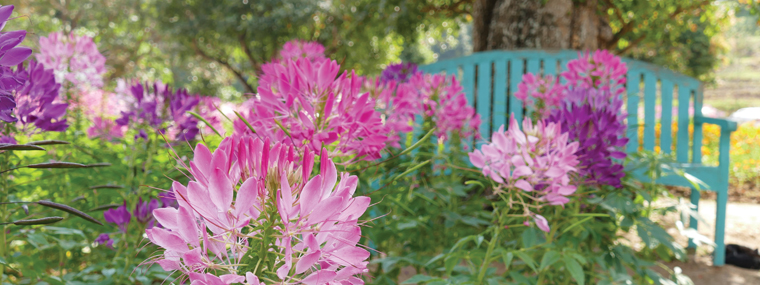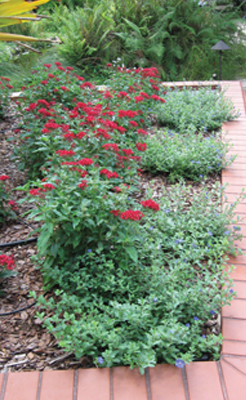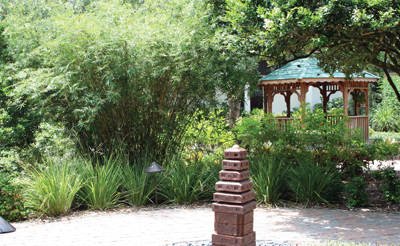
Recycle Your Landscape
By Lynn Barber / Published May 2016

I’m sure you have all heard about the three Rs. No, I mean reduce, reuse, and recycle. Well, we have added a fourth: repeat. Anything worth doing is worth repeating! The four Rs will save you time, money, and perspiration.
Let’s start with reduce. You can reduce water consumption by purchasing drought-tolerant plants. To determine what plants fall into that category, please see the University of Florida’s Florida-Friendly LandscapingTM Guide to Plant Selection and Landscape Design, which can be viewed at fyn.ifas.ufl.edu/pdf/FYN_Plant_Selection_Guide_v090110.pdf. This Guide provides plant and site requirements, including  mature height, spread, pH, soil texture and moisture, sun or shade, native or non-native, wildlife attracted, and much more. If you hydrozone your plants, meaning you group plants by watering needs, you can decrease the number of plants suffering/dying from over- or under-watering. You can decrease the amount of money you spend on plants by propagating your plants or sharing with friends and neighbors. Many garden clubs have annual plant sales and good prices. If you have an area of turfgrass that does not receive at least five hours of sunlight a day, it will not thrive in that environment, even if it is shade tolerant. So, consider utilizing a shade-tolerant groundcover in that area. Purposeful turfgrass is great where you need it for your pets, a play area for children, access to another part of your landscape, or recreation. You can reduce the amount of landscape pruning by utilizing plants that are the height and spread
mature height, spread, pH, soil texture and moisture, sun or shade, native or non-native, wildlife attracted, and much more. If you hydrozone your plants, meaning you group plants by watering needs, you can decrease the number of plants suffering/dying from over- or under-watering. You can decrease the amount of money you spend on plants by propagating your plants or sharing with friends and neighbors. Many garden clubs have annual plant sales and good prices. If you have an area of turfgrass that does not receive at least five hours of sunlight a day, it will not thrive in that environment, even if it is shade tolerant. So, consider utilizing a shade-tolerant groundcover in that area. Purposeful turfgrass is great where you need it for your pets, a play area for children, access to another part of your landscape, or recreation. You can reduce the amount of landscape pruning by utilizing plants that are the height and spread  for a particular area and consider slow-growing plant materials. Microirrigation in landscape beds decreases the amount of water utilized for irrigation; it is gallons per hour versus gallons per minute from an inground irrigation system. Mulching landscape beds conserves water also because mulch retains moisture in the soil.
for a particular area and consider slow-growing plant materials. Microirrigation in landscape beds decreases the amount of water utilized for irrigation; it is gallons per hour versus gallons per minute from an inground irrigation system. Mulching landscape beds conserves water also because mulch retains moisture in the soil.
Moving on to reuse: Divide plants that clump, propagate cuttings in water or using a rooting hormone, save and plant seeds. Relocate plants from one area of your landscape to another for repetition of color, form, texture, proportion, and balance. Recycled yard art can be easily created by those of us who are crafty or purchased from others that have more talents than we may have.
And, let’s consider recycling. Harvesting rainwater recycles a free resource and works very well for ornamental landscape plants, like those on your front porch or lanai. Many types of gardening tools are made from recycled products and made for longevity. You can compost your plant prunings, purchase recycled yard waste, or work with a tree trimming company that would otherwise have to pay to unload and/or use oak leaves or pine needles as mulch. The University of Florida recommends turfgrass fertilization two or three times per year. However, by leaving grass clippings on your turfgrass, you can decrease fertilizations by one, meaning you  need to fertilize once or twice per year. Grass clippings break down quickly and provide nitrogen to the turfgrass. Some people think thatch is caused by leaving grass clippings on the lawn. That is not the case. Thatch is caused by over-watering and over-fertilizing. It is a combination of dead and living plant material between green vegetation and the soil surface. One inch or more is problematic in Florida turfgrass. For additional information on thatch, please see the University of Florida publication, “Thatch and Its Control in Florida Lawns,” by L.E. Trenholm, J.B. Unruh and John L. Cisa, at: manatee.ifas.ufl.edu/lawn_and_garden/master-gardener/gardening-manatee-style/t/thatch-in-lawns.pdf.
need to fertilize once or twice per year. Grass clippings break down quickly and provide nitrogen to the turfgrass. Some people think thatch is caused by leaving grass clippings on the lawn. That is not the case. Thatch is caused by over-watering and over-fertilizing. It is a combination of dead and living plant material between green vegetation and the soil surface. One inch or more is problematic in Florida turfgrass. For additional information on thatch, please see the University of Florida publication, “Thatch and Its Control in Florida Lawns,” by L.E. Trenholm, J.B. Unruh and John L. Cisa, at: manatee.ifas.ufl.edu/lawn_and_garden/master-gardener/gardening-manatee-style/t/thatch-in-lawns.pdf.
By repeating the above reduce, reuse, and recycle concepts, you will have more time to do other fun things in which you are interested, such as reading, golfing, shopping, taking a vacation, or chilling out by a pool.
As always, follow the landscape or architectural control procedures in your deed restrictions before making changes. For more information about the nine principles of the Florida-Friendly LandscapingTM Program, or for assistance with gardening related questions, contact your local county Extension office and/or visit the University of Florida website solutionsforyourlife.com or edis.ifas.ufl.edu.
Lynn Barber
Agent, University of Florida/IFAS Extension, Hillsborough County
Lynn Barber, Agent, University of Florida/IFAS Extension, Hillsborough County, is responsible for educating residents on the nine principles of the Florida Friendly LandscapingTM program. These principles include right plant right place, water efficiently, fertilize appropriately, mulch, attract wildlife, manage yard pests responsibly, recycle, reduce stormwater runoff, and protect the waterfront. Barber is past president of the Florida Association of Natural Resource Extension Professionals and has received numerous awards for programming, publications, and television and radio segments. As a Master Gardener, she has given back thousands of hours in environmental horticulture education to the community.


